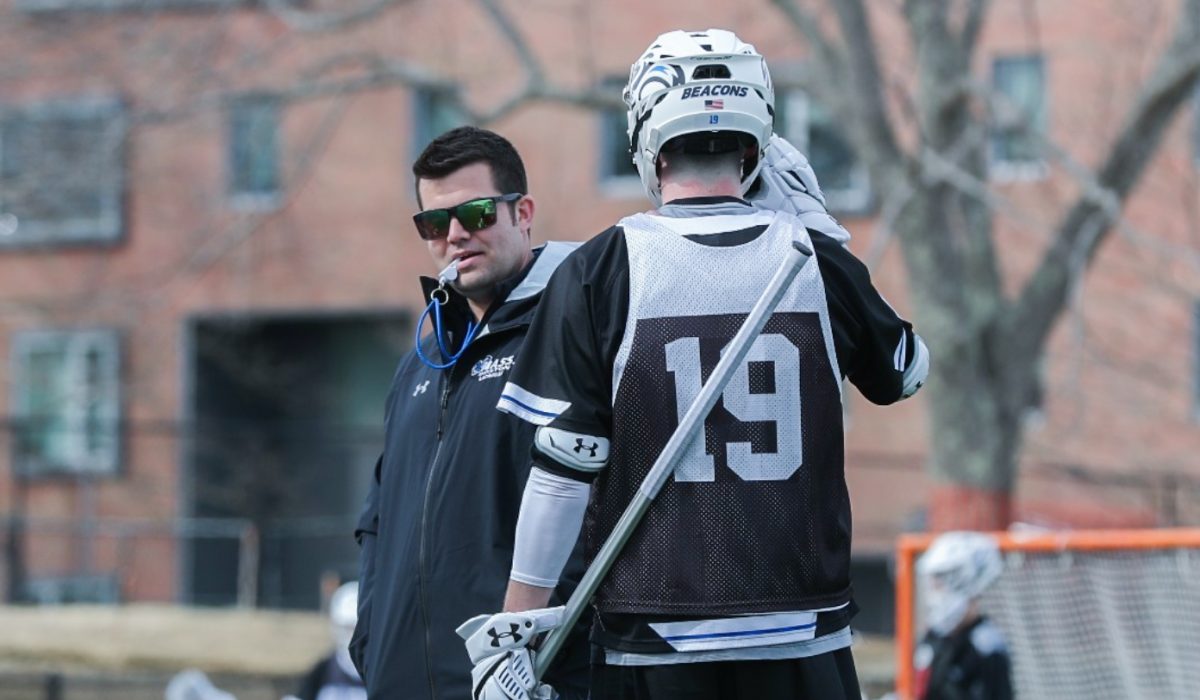Recruitment is one of the most crucial parts of a coach’s job, which is oftentimes overlooked when looking at the program. Oftentimes, the perception of a coach’s responsibilities is limited to the number of practices they take and the skills they impart to their players.
But there is so much more; a coach works tirelessly 365 days a year to ensure their athletes benefit the most out of the program. This starts at the base level with recruitment.
What kind of people would one like to surround themselves with? Who would add to the team and make-up for the graduates UMass Boston loses every year?
Tyler Low, the head coach of UMass Boston’s Men’s Lacrosse program, shoulders this responsibility with style.
Low has been working as a Head Coach for 14 years and has been a part of UMass Boston’s athletic department for 15 years. When asked about what he looks for in his players, his answer was simple yet obvious.
“For us, the most important trait is that we want them to be of high character, which is reflected in the attention they put on the academic side, as well as leadership roles. Kind of outside of athletics in their time in high school: previous institutions, coaches, guidance counselors and teachers recommendations. We wanna make sure we have great kids that are gonna have a positive impact on the community here, and those tend to be the ones who have the most success in the field. We look for great athletes first and foremost, and those that are not deterred by challenges when things get hard.”
Coach Low, more than anything, looks for players with character and of great caliber. He wants good athletes who pay attention to other aspects of their collegiate career as they do in their athletic one. In his words, “the kids who not only play on the field, but also sit on the first two benches in class.”
Low is clear on his requirements and ensures the athletes meet every single one. He expects his players to have at least a 3.0 GPA, which adds to his goal of a team GPA of 3.3. He takes academics as seriously as he takes athletic performance.
Like many coaches, Low starts his selection process with ground level research. He gets in touch with the coaches, family members and the people close to the prospect. This helps him get an insight on the parts of the player’s life that are not documented, as well know his athletes’ background and what type of environment they come from.
The NCAA does not play a pivotal role in the process, as there are no monetary resources involved in Division III. The only thing that the NCAA emphasizes is that coaches can’t poach players from other colleges in the same division.
Coach Low stated that, “We look for athletes who can compete at the Division I level but wish to come to UMass Boston for academics, just for the city of Boston and stuff like that.” But that doesn’t mean he disregards academics and goes easy on these players. There have been students that Low has turned down because they couldn’t compete on the academic front and failed to meet the selection criteria.
UMass Boston has one of the best lacrosse programs and the credit goes to Tyler Low. He molds his players in a way that no tide can drown. His strategies are clearly promising, as the athletes he brings in do not fail.
A lot of times, it is not just recruiting the best athlete, but shaping them to fit into the team in a way that does not compromise their skills.
A new athlete can make or break the team, but a coach sets the trajectory of the programs. And the spectacular performance that men’s lacrosse has put together is living proof of Coach Low’s legacy.


